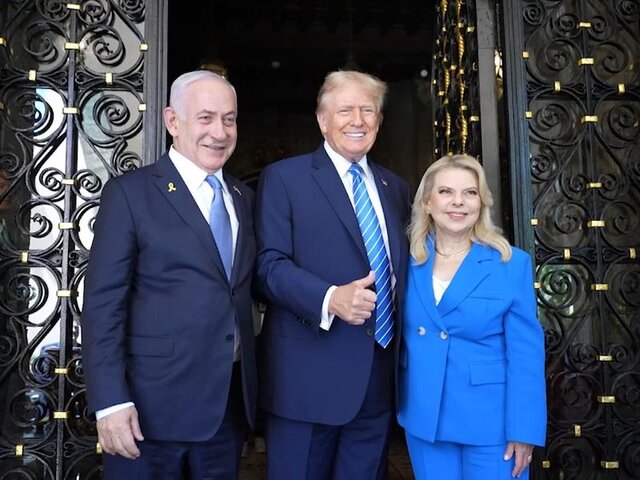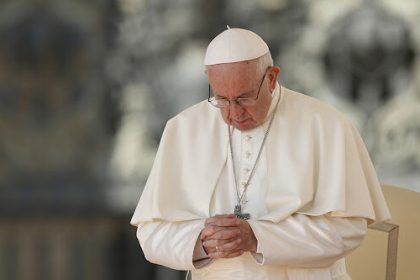Foreign Affairs: Trump does not seem to warm to Netanyahu
The Prime Minister of the Zionist regime is hoping for Donald Trump’s full support for this regime, but Trump’s records and the resilience of the resistance movements in the region show that this hope is futile.
According to Isna, the American media reported in an article referring to the victory of “Donald Trump” in the US presidential election that the Zionist regime hopes to disrupt regional equations by benefiting from his full-fledged support, but this full-fledged support is a crude fantasy.
According to the American publication “Foreign Affairs”, after 13 months of war in Gaza and conflict with Hezbollah, Netanyahu now sees himself in a better position inside and outside the occupied territories. He and his government now have an opportunity to change the balance of power in West Asia, and with the strong support of the extreme right wing, they are trying to realize a vague concept called “total victory”.
According to this report, the Zionist regime is trying to prolong the war in Gaza and lay the groundwork for the long-term presence of the Zionist military in the northern part of the Gaza Strip. This regime also seeks to impose a new order on Lebanon, destroy the power of regional resistance movements, and undermine Iran’s peaceful nuclear program. Some members of the ruling coalition of the occupying regime wish to destroy the two-state solution, and this is while Netanyahu himself is eyeing the normalization of relations between this regime and Saudi Arabia. Netanyahu is sure that Trump will fully support him after he returns to the White House.
But according to Foreign Affairs, these assumptions about the military power of the Zionist regime and the amount of possible support for Trump are greatly exaggerated. Tactical successes on the battlefield cannot lead to sustainable security without political and diplomatic foresight. There is a possibility that the Zionist regime will involve itself in different war fronts and will have to take responsibility for a large population of civilians in Gaza and Lebanon. Attracting the support of Arab world countries also requires the removal of extremist figures from the Zionist regime’s cabinet, more than the defeat of Hamas and Hezbollah, while Netanyahu will be removed from power without their presence.
Nevertheless, Netanyahu and his allies believe that the future Trump administration will unconditionally support the Zionist regime. But the recent expression of the Zionists’ desire to reach an agreement with Lebanon’s Hezbollah means that even Netanyahu knows that Trump will not go along with the endless adventures of this occupying regime in the region. In addition to the Lebanese front, Iran is also another scene in which the Zionist regime prefers not to act alone and needs Washington’s support.
Gaza
The Netanyahu government hopes to make other regional powers come to an agreement with the Zionist regime by realizing its dream goals, including the destruction of Hamas, the control of Hezbollah, and the containment of Iran!
The Zionists think that if Saudi Arabia normalizes relations with this regime, other Arab countries in the region will line up to restore their relations with Tel Aviv. Therefore, Trump, who had established warm relations with Saudi Arabia in the first round of his presidency, becomes the trump card of the Zionist regime.
Trump has been introduced by Netanyahu as “Israel’s greatest friend” and the Zionists hope that he will support this regime unconditionally. On the other hand, the supporters of the Zionist regime that Trump has appointed to positions related to this regime have strengthened this impression. On the other hand, one of the main reasons for Netanyahu’s ambitions is that his far-right partners in the ruling coalition will not settle for anything less.
According to Foreign Affairs, their insistence on their extremist goals, which guarantees the survival of Prime Minister Netanyahu, has become a permanent obstacle for the members of the security institutions of the occupying regime, institutions that know that the continuation of offensive operations is not in the interest of this regime and its army. These extremist figures have even opposed the positions of the families of the Zionist prisoners.
For months, these families have been demanding an agreement for the release of the Zionist prisoners and they have significant support from the American government. But Netanyahu has been able to overcome the resistance of the prisoners’ families by relying on his extreme right wing and also people who do not accept Hamas’ conditions for establishing a ceasefire. With Trump in office, Netanyahu assumes that the United States will put less pressure on Israel to end military operations and release prisoners.

Family gathering of Zionist prisoners
But according to the American media, Netanyahu and his entourage do not pay attention to the basic problems of these ambitious plans, including the fact that Iran and the resistance movement in the region cannot be destroyed. Hamas, Hezbollah and Yemen’s Ansarullah have already shown their resistance and are rebuilding their forces. They still have considerable firepower and are able to target the occupied territories with hundreds of rockets, ballistic missiles and drones every day; As in recent months, they have been able to create widespread chaos in the occupied lands and send Zionists to shelters continuously.
Pointing out that even the idea of the surrender of these factions is fanciful, Faren Afrez pointed to the fact that no ambitious plan by the Zionist regime will be realized without significant help from Washington. Meanwhile, the Zionist regime needs America’s support more than ever, so the idea that America’s support will be unquestionable is a false fantasy.
Referring to Trump’s gratitude to Arab and Muslim American voters for winning the election, this report states that this could be a sign of a revision of Trump’s policies. If we consider this alongside Trump’s general distaste for America’s endless intervention in military conflicts around the world, we can see that the occupying regime may not be among the priorities of the new Trump administration.
In addition, Trump ended his first term with verbal clashes with Netanyahu, making it clear that he had no desire for Israel to continue hostilities. In his meeting with Netanyahu in July, he asked the Prime Minister of the occupation regime to end the war before Biden leaves the presidential office.

Trump’s meeting with Netanyahu and his wife
On the other hand, the supporters of the extensive settlements of the Zionist regime in the West Bank, who are among the biggest supporters of Trump, may soon find out that Trump is not very committed to their positions and agenda.
Trump’s general positions in foreign policy can also be problematic for the Zionist regime. In September, he told reporters that America should come to an agreement with Tehran, and a month later he emphasized that he would end the “suffering and destruction in Lebanon”.
The Zionist regime recently received an advanced Taad anti-ballistic missile system from the United States and hosts 100 American military forces to control these systems. According to Foreign Affairs, Trump may not remove these weapons from the occupied territories, but his apparent unwillingness to allocate US forces and financial resources abroad means that US support will decrease in the future and the freedom of action of the occupying regime’s army will be limited. will be
On the other hand, France, Germany, and Britain, which did not help defend the Zionist regime in the second Iranian missile attack in October, have all limited arms exports to the Zionist regime and raised concerns about the regime’s compliance with international laws. In addition, international institutions such as the United Nations, the International Court of Justice and the International Criminal Court, which have long opposed the crimes of the Zionist regime, have reacted to the current behavior of this regime, and the International Criminal Court even ordered the arrest of Netanyahu and Minister Yoav Galant. His former war has been issued.
Pointing out that these restrictions can have increasingly negative consequences on the freedom of action of the occupying regime’s army in advancing Tel Aviv’s goals in the region, Faren Afrez emphasized that this regime is facing serious risks and its ability to end the current conflicts is greatly affected by how Netanyahu’s interaction with Trump will depend.
end of message
News>RCO NEWS
RCO
















